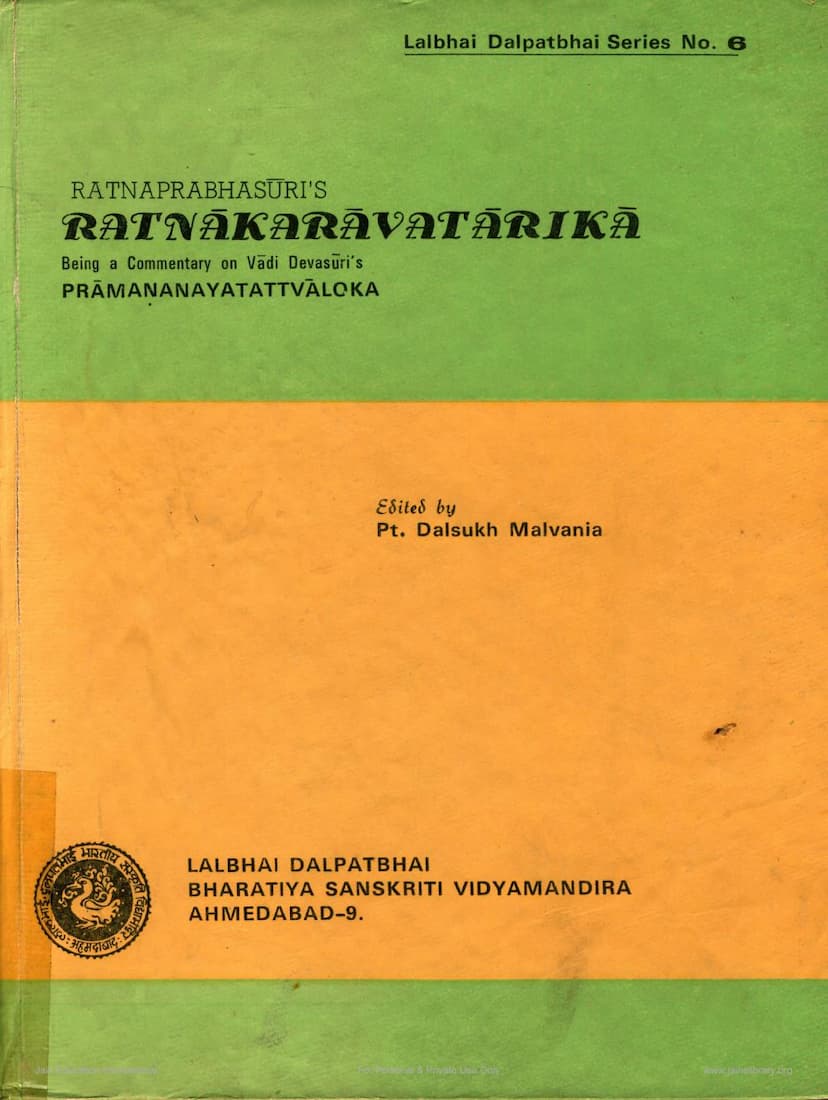Ratnakaravatarika
Added to library: September 2, 2025

Summary
The provided text is a detailed description of the publication "Ratnākarāvatārikā" by Ratnaprahasūri, a commentary on Vādi Devasūri's "Pramāṇanayatattvāloka." The book, published by the L. D. Institute of Indology, Ahmedabad, is part of the Lalbhai Dalpatbhai Series (No. 6). It includes Sanskrit super-commentaries by Rajasekharasūri (Panjika) and Pt. Jñanachandra (Tippaṇa), along with a Gujarati translation by Muni Shri Malayavijayaji. The work was edited by Pt. Dalsukh Malvania.
Here's a summary of the key information and themes presented in the text:
1. The Text and Its Significance:
- Title: Ratnākarāvatārikā
- Author of Commentary: Ratnaprahasūri
- Original Work: Pramāṇanayatattvāloka
- Author of Original Work: Vādi Devasūri (A.D. 1086 - 1169)
- Significance: The Pramāṇanayatattvāloka is considered a "source-book of Indian Logic," particularly important for Jaina Logic, which was fully developed in the 18th century. It covers all essential topics of Indian logic of that era.
- Vādi Devasūri's Auto-commentary: Syadvādaratnākara, described as an "ocean in depth and extent."
- Ratnaprahasūri's Commentary (Ratnākarāvatārikā): A "brief and elucidatory" commentary on Syadvādaratnākara, making the text more accessible.
- Super-commentaries: The publication includes the Panjika by Rajasekharasūri and the Tippaṇa by Pt. Jñanachandra for further clarification of Ratnākarāvatārikā.
- Gujarati Translation: Muni Shri Malayavijayaji's translation is the first Gujarati translation of the Ratnākarāvatārikā, making the complex text accessible to Gujarati readers, especially students of Jain logic.
2. Publication Details:
- Publisher: L. D. Institute of Indology, Ahmedabad-9.
- Series: Lalbhai Dalpatbhai Series No. 6.
- Editors/General Editors: Pt. Dalsukh Malvania, Ambalal P. Shah.
- First Edition: November 1965 (500 copies).
- Second Edition: December 1993 (500 copies).
- Financial Assistance: Gujarat Sahitya Academy, Government of Gujarat.
- Printing: Arth Computer, Ahmedabad.
- Editorial Support: The preface expresses gratitude to Muni Shri Malayavijayaji for the translation and acknowledges the influence of the excellent edition by Late Pt. Haragovindas and Pt. Bechardas. It also thanks the publishers of Yashovijaya Granthamala, Varanasi, for their editions.
3. Content and Structure (as indicated by the "Vishayanukram" - Table of Contents):
- Chapter 1 (Pratham Parichchhed): Nirupaṇa of the nature of Pramāṇa (means of knowledge). Topics include:
- Definition of Pramāṇa.
- The validity (Prāmāṇya) of knowledge.
- The nature of Samavāya (connection) between words and their meanings.
- Discussions on various philosophical concepts like Śūnyavāda (Nihilism) and Brahmavāda (Monism).
- Analysis of the self-awareness (Svusaṁvedana) of knowledge.
- The nature of validity and invalidity (Prāmāṇyāprāmāṇya).
- Chapter 2 (Dvitīya Parichchhed): Nirupaṇa of the nature of Pratyakṣa (Direct Perception). Topics include:
- Classification of Pramāṇa.
- Defense of Pratyakṣa.
- Discussion on Sāṁvyavahārika Pratyakṣa (Conventional Direct Perception).
- Analysis of the sensory process (Avagraha, etc.).
- Discussion on Pāramārthika Pratyakṣa (Absolute Direct Perception).
- Refutation of concepts like the absence of darkness (Tamaso'bhāvattva).
- The substantiality of shadows (Chāyāyāḥ bhāvarūpatva).
- Proof of Omniscience (Sarvajñatva).
- Refutation of God as the creator of the universe (Īśvarasya jagatkartṛtvanirāsaḥ).
- The concept of the Kevali's (liberated beings) consumption of food (Kevalinaḥ kavalāhārasiddhiḥ).
4. Key Philosophical Discussions Highlighted in the Prefaces and Editor's Notes:
- The text delves into complex aspects of Indian Logic, particularly Jain Logic.
- It addresses the definition and nature of Pramāṇa (means of valid knowledge) and Naya (standpoints or partial truths).
- It discusses the validity and invalidity of knowledge, the relationship between words and their meanings, and refutes various heterodox philosophical schools like Buddhism (Śūnyavāda) and Brahmanism (Brahmavāda).
- The concept of Pratyakṣa (direct perception) is analyzed, differentiating between conventional (Sāṁvyavahārika) and absolute (Pāramārthika) perception.
- The text engages with the idea of the impersonal nature of knowledge and the validity of perception, contrasting it with other schools of thought.
- A significant portion of the editorial commentary discusses the philosophical debates surrounding word-meaning relationships, the nature of reality, and the validity of different pramāṇas.
- The editor, Pt. Dalsukh Malvania, emphasizes the difficulty of the text and the crucial role of Muni Malayavijayaji's translation in making it accessible.
In essence, the publication is a scholarly endeavor to present a foundational text of Jaina logic, enriched with historical commentaries and a modern translation, making it a valuable resource for scholars and students of Indian philosophy and logic.